One Day in the Life of a Tours and Visits Team Leader (Part II)
Sorry for so abruptly abandoning you yesterday. Please rest assured that if you’re ever on a tour with me, I won’t do that to you. 🙂
So, where did I leave off? Oh yes – 10 a.m.
10 a.m. Training with church partners that will be visited by another tour arriving in a few weeks. We asked six directors to come but most of them are late.
When I start 30 minutes later, I can’t go fast due to the fact that this will be a visit to their centers and they have a lot of questions.
I give them examples of what to do and what not to do, and encourage them to ask questions.
They are very excited for the visit and have a lot of enthusiasm and suggestions. Great!
But still we have to provide several guidelines. For example about the food.
We need to avoid too much spice, raw salads or any other thing that causes problems, and at the same time, not eat chicken every day.
Luckily our food is wonderful and we have lots of choices, but we cannot serve guinea pig or our best seafood dish, ceviche. Not all visitors are so adventurous to eat an animal they would view as a pet, or raw fish with chili.
Besides food, there are other intercultural issues to manage.
Time is a more relaxed concept in Peru and in all South America. To be sure that both standards meet, I tell church partners to be ready half an hour in advance. This way, they are really ready when we arrive … most of the time.
I often call in advance, though, and sometimes I have told the driver to go slowly while I point out some interesting views on the road to gain some time.
Also, for home visits I’ve learned that “accessibility” is quite a different concept for center staff, who are used to going up and down the hills – though per the visitors report, I should call them mountains – without using stairs.
I have learned to be suspicious when they say that the house to visit is located “aquicito nomas” (or very, very close).
I ask them to provide at least one house that is really close and in a flat area. They tell me that all are accessible by mototaxi, (a motorbike that pulls small car with a seat for two people), but still I ask for the names of the children to be visited and give ideas for the grocery bags we will give away at each home visit.
Another difficulty is finding the best way to communicate our ideas to the center staff. They are very loving and committed people, but many of them do not have higher education. However, they have a lot of resources and are very creative. But still, I need to set clear guidelines.
1 p.m. Lunch with the center directors. They continue to ask questions about the visit, and Elia and I continue to answer. As we usually translate in lunches and dinners, we know the art of talking and eating at the same time, so this is no problem.
The center staff are very friendly and excited, so they talk a lot.
2 p.m. We continue with the training. The directors make a draft program for the visits; each one now knows what we will see at their child development center: Child Survival Program mothers and babies, new center, older center, kindergarten children, boys and girls, teenagers, workshops, Leadership Development Program students, former participants of Compassion’s program, home visits, etc.
In this way, the visitors will have the whole screen of Compassion work. Some centers also have children who will attend the fun day to meet their sponsors.
Now the coordination is made and, God willing, all will be ready when we visit the centers in some weeks.
Then I get an instant message from the Global Ministry Center, but I explain to that person that I am in a meeting and I see if he can wait. We agree to talk when my training is over.
3 p.m. Back at my desk. I have time to write down clearly some of the ideas the church partners had in the meeting. This will improve the materials for future training.
Another instant message. I see what they need and answer. However, I am not ready to answer all of it, as some answers have not arrived from the centers yet. I have to ask for more time.
I try to make one urgent call to answer, but the center does not work today so I have to wait until tomorrow.
3:15 p.m. My manager calls to get an answer about the approval for a tour request for next year. (more…)
One Day in the Life of a Trips and Visits Team Leader
My name is Soledad Agreda, and I am the Trips and Visits Team Leader of the Peru office. I have been doing this work for about a year and a half now, and my main responsibilities are to organize, facilitate and host individual sponsor visits and trips along with Elia Sipan, the Trips and Visits Specialist.
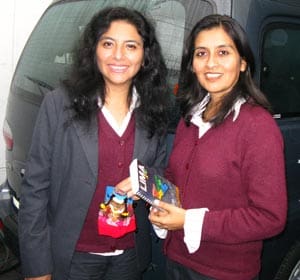 Our positions are thought to be some of the most exciting in Compassion. We get to go out a lot, travel on a regular basis, go to nice dinners and get to know many interesting people. It is true, my position involves these things, but it is actually much more.
Our positions are thought to be some of the most exciting in Compassion. We get to go out a lot, travel on a regular basis, go to nice dinners and get to know many interesting people. It is true, my position involves these things, but it is actually much more.
With the purpose of giving a better understanding, I will describe one day in my life, but I would like to give some more information about me first.
I am single and still live with my parents and my brother. I have been working with Compassion for 12 years now.
Because I worked as a translator for children and sponsor letters before becoming an employee, when I became an employee, I started working with correspondence. However, my previous manager, who is now the country director, encouraged me to focus on sponsor visits as I had the skills of fluent English, intercultural experience and getting along well with people.
So I have been in sponsor visits since the very first year I joined Compassion. Besides the fact that I really like children and enjoy being with them, one reason I decided to work here is because I felt at home with Compassion.
As a result of my work, I have learned that I can do more things than I ever expected.
At first I did not know I could become a Trips and Visits Team Leader. In fact, the position did not even exist at that time. But as I worked through the years, I overcame some of my limitations (like not knowing Lima well; now I have a map in my head) and built my strengths (like my love for reading and history, a great help to answer questions and provide information).
Also, I have seen the faithfulness of God in the ministry and in my life and how He has taken Compassion and me beyond what we expected.
I believe we really have the opportunity to deliver children from poverty. And I still remember many years ago, while I was translating for a video, I asked the final question to the young mother we were interviewing: “What do you want for the future of your child?”
She held the 4-year-old girl, looked around the one poor room she called home, and seemed to think how trapped she was there, with a husband without a steady job, no education and the first of many children to come already in her lap.
Then she stared at me while she answered: “I want her to have a life different than mine, that she can study and progress … I do not want her to have my same life.”
So that is why we work. That is why I am here.
If I could tell you one thing it is that you should know how important you are for the children and how sad they feel when they do not get any correspondence.
Money means a lot, but emotional support and care is even more important for reaching our goal, which is what this mother mentioned: to give our children the chance for a different life.
Now let’s see what a day can be like for me. (more…)
Continue Reading ›A Typical School Day for Brenda
In Uganda, the name “Makerere” is synonymous with Uganda’s oldest and most prestigious institute of higher learning: Makerere University. The university sits on Makerere Hill and is not only revered for its students’ academic proficiency and health education, but also for the spacious, manicured lawns and modern buildings that constitute this seat of learning.
In the slum community of Makerere Kivulu that lies in the shadow of this prominent institute, the storm drains overflow with filth and stinking water between rows of shacks made of planks and rusty iron sheets. The dilapidation of these structures is set off by the stable buildings surrounded by high stone walls that dot the area.
Many of the people in the community are unemployed, and even those who are employed are underemployed, dealing in small businesses like hawking goods, frying and roasting food like cassava, and selling vegetables like tomatoes and eggplants.
Most of them earn a maximum of about a dollar a day. In despair, many of the women look to prostitution to earn a living, and the men resort to alcohol and spend their days drunk. The youth form gangs and go about stealing and indulging in drugs.
It is this community that 13-year-old Brenda wakes up to every morning at 6 a.m. (more…)
Jaimito: A Day in His Own Words
Jaime is 11 years old and lives in the La Prosperina neighborhood. He had the happy opportunity to be registered at Jesús es Amor Student Center about six years ago.
Jaimito, as many of his friends call him, is a very joyful, outgoing, obedient and disciplined child. He truly loves his parents and siblings, and most of all he has surrendered his heart to God.
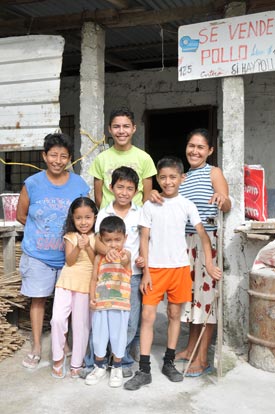 Jaime and his four siblings — Jesús (16), Jonathan (9), Allison (5) and Aarón (3) — live with their parents, Jaime and María, in the basement of a humble house. Jaimito’s grandma on his dad’s side gave the house to the family 16 years ago. It was once a warehouse full of old and useless stuff, but now it is Jaimito’s home.
Jaime and his four siblings — Jesús (16), Jonathan (9), Allison (5) and Aarón (3) — live with their parents, Jaime and María, in the basement of a humble house. Jaimito’s grandma on his dad’s side gave the house to the family 16 years ago. It was once a warehouse full of old and useless stuff, but now it is Jaimito’s home.
Jaime’s father doesn’t have a steady job. He’s an artisan who makes plaster layers that are used in roofs in most houses on the coast. Currently, he works at a little artisanal factory. He makes U.S. $40 every week.
On the other hand, María, Jaime’s mother, doesn’t work. She does all the chores at home and takes care of her five children. She would love to find a job that would enable her to sustain her family too.
María graduated as a nurse’s helper a short while ago. She took a one-year course at a local institute.
Jaimito: A Day in His Own Words
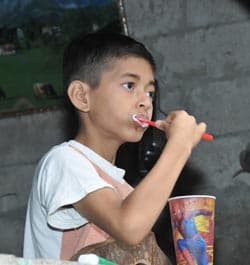 Normally, I get up at 6:30 a.m. and get myself ready to go to the center. I wash my face, brush my teeth, and then have breakfast with my family.
Normally, I get up at 6:30 a.m. and get myself ready to go to the center. I wash my face, brush my teeth, and then have breakfast with my family.
My mom usually puts a cup of coffee and a piece of bread or some crackers on the table for each of us. Breakfast is the coolest time of the day because my entire family is there.
After that, I take my medicine — the one that the doctor prescribed. She’s the doctor from the center. She’s really kind and always treats me nicely. She also encourages me a lot. I know she will totally help me to get well soon.
I leave for the center around 8:30 a.m. (more…)
A New Day for Kamrul
Kamrul starts his day very early in the morning. He leaves his bed just after sunrise and washes his face from the nearest pond. After having a little cold rice from the previous night, he leaves for work.
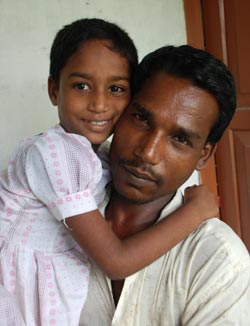 These days, Kamrul feels very relaxed. He doesn’t have to pay rent to the cycle van owner daily. He has his own van now. It is the most useful gift for his family.
These days, Kamrul feels very relaxed. He doesn’t have to pay rent to the cycle van owner daily. He has his own van now. It is the most useful gift for his family.
Kamrul has been blessed by your generosity. His new cycle van ensures a decent life for his family. Kamrul considers himself a fortunate father of a Compassion-assisted child. His 8-year-old daughter, Mukta, is the channel of blessings in his family.
Every morning, Kamrul drives to the nearest village market for passengers or a load to carry. If he is fortunate enough, he can get more than two passengers at a time and heavy stuff to carry. He earns 100-120 taka (U.S.$1.45-$1.74) per day by driving his cycle van.
“One hundred taka ($1.45) per day for me is the same as 100,000 taka ($1,450) for the rich people living in the big cities. This 100 taka allows me to buy food for my children and keep my family.”
In the rainy and cold season he earns less than that, but the money is still adequate to buy food for his children. It wouldn’t be possible if he didn’t have his own cycle van.
Previously, he had to pay around 100-120 taka as rent for a cycle van. He had very little left for his family. To pay the owner on a regular basis was a Herculean task for Kamrul. It took eight out of his 11 hours of working to earn the money for the owner.
Now Kamrul believes that his bad days are over and he can do something more for his children and family.
Kamrul’s working hours are now more flexible. To work eight hours throughout the day is enough for him to take care of his family.
Whenever he is on the road driving his cycle van, he keeps the faces of his children in his mind rather than the worry of paying the owner of the cycle van. You made this possible for him. (more…)
Kamrul Receives His Cycle Van
Kamrul received the cycle van you bought him! He received it eight days ago.
It was another hot afternoon at Suagram, and Mukta ran to her grandmother’s house. “Granny! Granny! Come out.”
An elderly woman came out; Mukta said loudly, “I am going to have a cycle van tomorrow. Now my father will drive my own cycle van.”
Her grandmother asked, “Who is giving you a cycle van?”
The 8-year-old girl replied proudly, “My Compassion center!”
The next day was very special for Mukta, her father, Kamrul, and their family. They were going to have a brand new van, as a gift from Compassion sponsors who read the U.S. blog.
Kamrul and his family dreamed about having their own cycle van for years. Although they considered Compassion as the great opportunity for their daughter’s development, they never thought that their dream of a cycle van could come true through the Compassion center. However God had a different plan for this family, and He used Compassion to bring blessings to them.
I reached Suagram Child Development Center at 8 a.m. Kamrul was there, waiting for me. He grabbed my hand and said, “Thank you so much, for what you did for us.”
I replied, “Don’t thank me. Thank Almighty God for his grace and thank the sponsors who made it possible.”
Kamrul said again, “I praised God thousands of times. Me and my family prayed for the sponsors and their families, that they could live a long, healthy and happy life.”
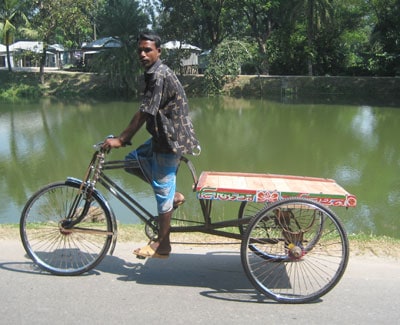
We went to the marketplace called “Ghaghar” to buy the cycle van. The child development center manager was also with us; he ordered the van the previous week. It was a nicely built cycle van.
The center manager was checking the cycle van, but I was observing the reaction on Kamrul’s face. There was a deep satisfaction and peace.
The center manager paid the bill and asked Kamrul, “Are you happy?”
He answered, “I couldn’t wish for more. This van will change the condition of my family.”
Kamrul took us on his new cycle van as his first passengers. He was driving faster than the previous time I rode his van. I thought there might be two reasons. The new cycle van was excellently made, and at that time Kamrul was the happiest man on the earth and wanted to fly.
We reached his house and paid him. Kamrul strongly refused to take money from me, but I was able to make him understand that he should take it as his first income from the van.
At his house, Mukta was waiting for us. As soon as Kamrul parked the van, little Mukta hopped on the van. She stood on the van and silently made us believe that it was her van.
Kamrul and his wife Rehana were getting busy to entertain us. The center manager tried to stop them, but Kamrul answered, “We couldn’t be able to give a treat to our beloved sponsors. So please let us entertain you with coconut water on behalf of the sponsors.”
Coconut water is a special drink in the rural areas; only special guests are entertained with coconut water. Kamrul and Rehana prepared and served coconut water to us. It was one of the sweetest and most refreshing drinks I have ever had.
Kamrul, Rehana, Mukta and little Sihab (Mukta’s younger brother) were sitting in front of us, and we were talking outside their house. A few neighbors also joined us.
I described to Kamrul and family about how our respected sponsors provided them the van. Kamrul shared his feelings:
“I am so pleased and amazed by the greatness of the Compassion sponsors. I struggled a lot with my family. Not even my own brother and sisters took care of us, but these people from thousands of miles away are thinking of our benefits.
This is amazing!
Now I can earn my own living and don’t have to pay the van owner daily. If I can work everyday then I won’t have any problem to maintain my family. At least I can buy food everyday for my children.
Please thank the sponsors on behalf of me and my family. Also tell them that their love is blessings for my family.
May God bless them and their children everyday!”
Rehana said, “Now my husband can work more freely. Hopefully we would overcome our difficult periods. Thanks to all the Compassion people and staff who made it possible for us. They think about us more than our own relatives.”
Mukta was having fun on the van. She said, “This is my van, and I will let my father drive it.”
Kamrul was laughing and replied, “Yes dear, it is your van.”
Mukta thanked all the sponsors in her own words and said in Bengali, “Amake van kine debar jonno tomader sobaike onek onek dhonnobad.” It means, “Many thanks to all of you for buying me this cycle van.”
Kamrul took his whole family on the van and had a fun drive. Later he picked up Mukta from the project on his van and took her home.
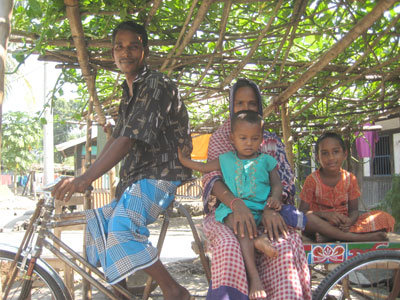
The gift amount was 10,200 Bangladeshi taka. The cycle van cost 9000 taka, and with the remaining 1,200 taka, the Compassion center bought a new pair of shoes for Mukta, a mosquito net, and two pillows for Kamrul’s family — things Kamrul and Mukta asked for.
It was a big day for this family. The satisfaction on Kamrul and Mukta’s face reminded me of the Grace of our heavenly Father.
Special thanks to all the sponsors who considered Kamrul as their own brother and Mukta as their own niece.
Today’s post is a followup to the August 7, 2008 post, A Day in the Life of a Bangladeshi Cycle Van Driver.
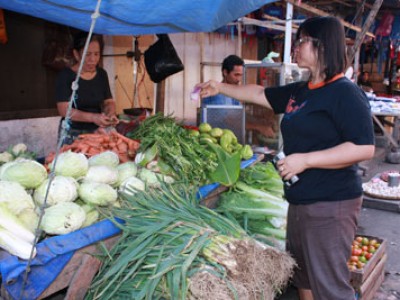
A Day in the Life of a Child Development Center Worker
Selvie, a 41-year-old single parent, has been serving as the coordinator of Elohim Child Development Center for almost two years now.
During her first year at the center, Selvie had been facing obstacles, which came from both her own family and the community around the center.
She had to take care of her two children and her new enlarged family. Her husband had left her after 16 years and left her in anguish. She moved back to her parents’ house, where her two siblings along with their families had just moved in, too.
The community doubted whether Selvie would be able to manage the ministry. They thought it was her fault that her family had been broken.
Surrendering to God’s will is what Selvie has been doing as well as raising her children. She has two children; the oldest, Indriani Natalia, graduated from college few months ago and the youngest, Aldo Aprillio Samuel, is in fifth grade now.
Selvie has been spending up to 12 hours a day for the ministry since appointed to be the center coordinator. Her daily activities are more or less the same:
- shopping for the children’s meal
- going to the center to help the cook prepare the meals and to clean up the church
- checking the reports and the day’s scheduled program
- having praise and worship with children
- talking with parents
- coordinating with staff members after the activity
- going back home
Spend a day with Selvie
A Day in the Life of a Bangladeshi Cycle Van Driver
Kamrul opens his eyes and looks out the window. It is still dark outside. He gets up and goes outside his house.
Kamrul washes his face with the water from the nearest pond. He breaks a branch from a nearby neem tree, whose branches are thin and good for teeth, and begins to clean his teeth. He is wearing just a lungi, the traditional Bangladeshi skirt for a male. He prepares himself for the hard day ahead of him. Kamrul, the father of Compassion-registered* child Mukta, is a cycle van puller. (more…)
Rosa: An Amazing Woman
I met an amazing young woman this week while leading a trip to see Compassion’s work in Honduras. The young woman’s name is Rosa, and she is part of Compassion’s Leadership Development Program.*
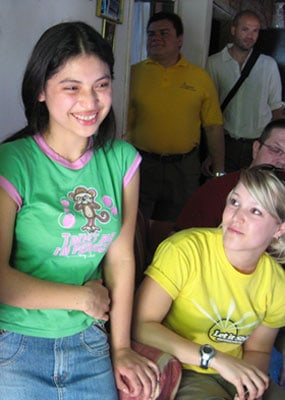 This university-based program, known as LDP, works with high achieving and high potential students from Compassion child development centers. The LDP program in Honduras is in its first year, and Rosa is one of 19 students in the inaugural class. It is inspiring to hear the LDP stories throughout the world, and I was honored to be in attendance at Ethiopia’s first LDP graduation a few months ago.
This university-based program, known as LDP, works with high achieving and high potential students from Compassion child development centers. The LDP program in Honduras is in its first year, and Rosa is one of 19 students in the inaugural class. It is inspiring to hear the LDP stories throughout the world, and I was honored to be in attendance at Ethiopia’s first LDP graduation a few months ago.
Compassion’s President, Wess Stafford, stood in front of the 24 Ethiopian graduates and congratulated them on completing their college degrees and then challenged them to be servant leaders in their communities and nation. He closed his talk to them by saying, “You may have been born into poverty, but poverty was not born into you.”
Rosa is a testimony to Wess’ statement. There were many times in her difficult life where she could have given up, and most of us would not have blamed her. However, if you spend just a few minutes with this remarkable 17-year-old girl, you will realize that giving up was not an option. She shared with us her daily schedule, and it is a great snapshot of the will and determination of Compassion’s LDP students.
6 a.m. – Wakes up each morning to clean the house and make sure all laundry is done for her mother and brother. Rosa’s mother raised all five of her children alone and works at a local restaurant cooking chicken.
8 a.m. – Prepares breakfast for her family.
9:30 a.m. – Begins baking tortillas to sell for the business she operates out of her home. Each day Rosa makes tortillas and people come from around the neighborhood to purchase them to eat for lunch. The money she earns from her business is used to help buy food for her family, and it also pays for her bus fare to and from the university.
12 p.m. – Finishes selling the tortillas and starts lunch for her 14-year-old brother. After he has eaten, she makes sure he gets off to school.
12:30 p.m. – Cleans up, eats her own lunch, and studies for her afternoon classes.
1:30 p.m. – Takes the city bus to the University of Tegulcigalpa, where she is a first-year student studying Business Administration.
7:30 p.m. – Returns to her home and spends the rest of the evening studying and spending time with her mother.
Rosa was asked what she would like to do once she graduates from university. “I eventually want to own and operate a business in my community but first I think I want to get my Masters degree,” she says.
The question, “What does success look like for Compassion International?” has become an easy one to answer because of students like Rosa.
*This content honors our historical Leadership Development Program. To learn more about our current youth development opportunities, click here. Brian Seay is an artist relations manager for Compassion, working with musicians and bands who advocate for Compassion and children in poverty. He was one of the bloggers on the Uganda blog trip.


